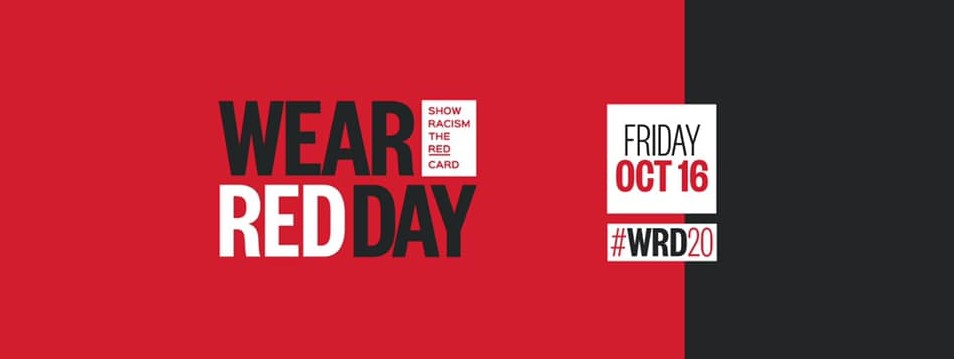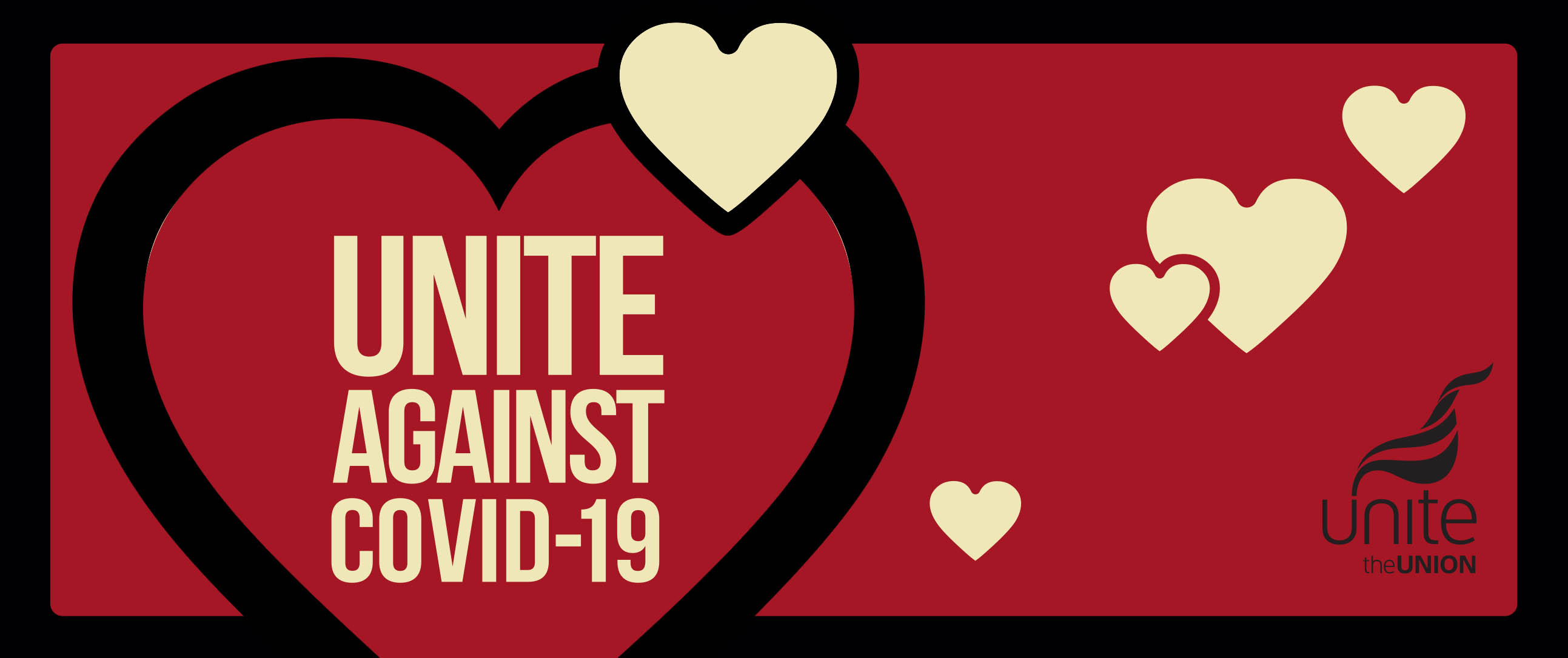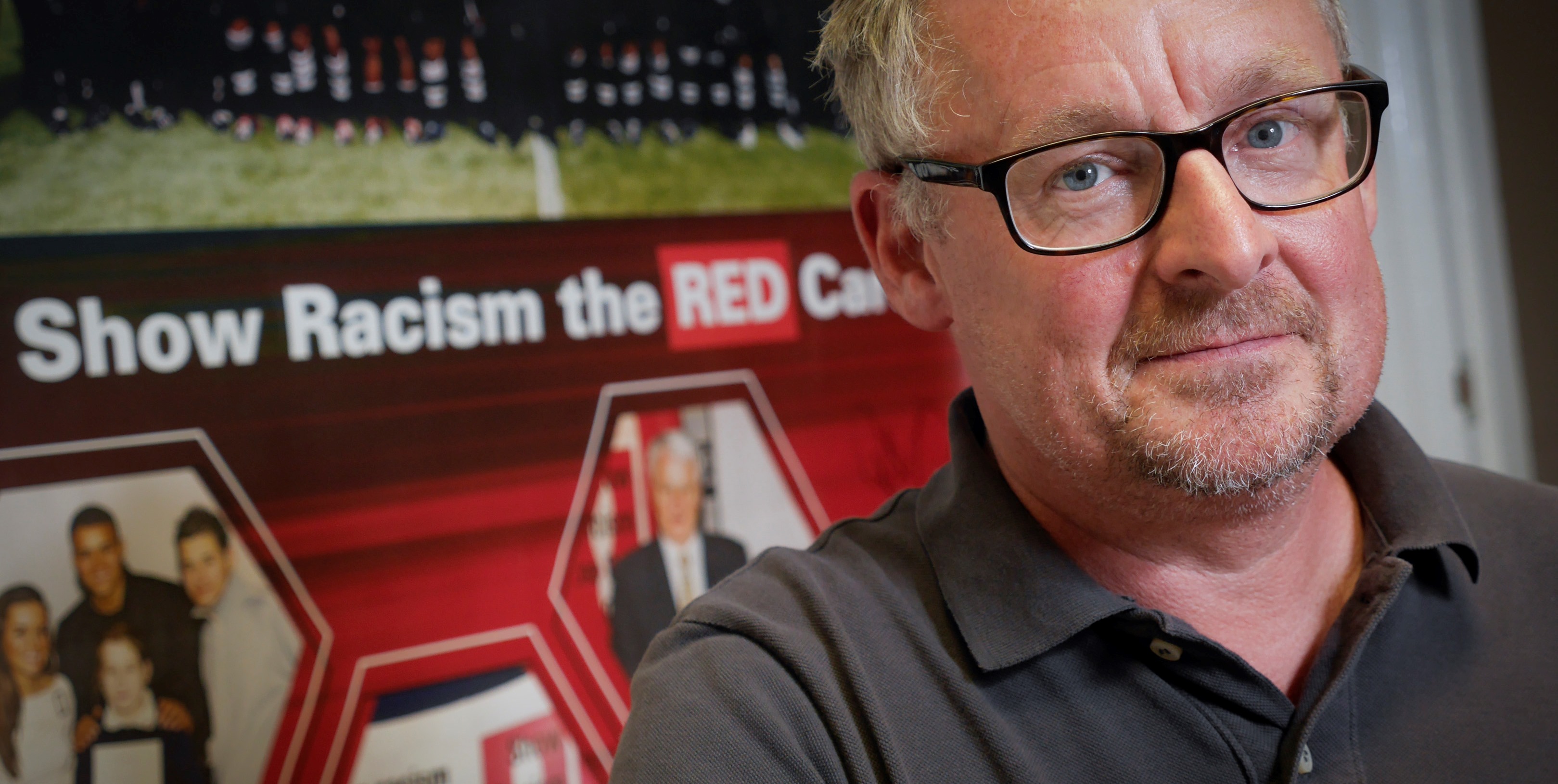Fighting the football hijackers
They say charity begins at home – and in many ways too so do society’s worst ills – like racism.
That’s why Show Racism the Red Card, an anti-racist education group, takes its message of strength and unity in diversity to every corner of people’s lives – to schools; to workplaces; and to local communities. And they do it through that most unifying British cultural institution of all – football.
But football’s power to bring people together is now being co-opted by the forces of division. What first began as a seemingly innocuous group set up in the aftermath of last year’s London Bridge terrorist attack, the Football Lads Alliance has now revealed itself to be a far-right breeding ground of Islamophobia and racial hatred.
Its supporters took to the streets in tens of thousands to rally behind former English Defence League (EDL) leader Tommy Robinson at a march earlier this year. Known right-wing extremists gave speeches, and violence and intimidation against counter-protestors has routinely broken out at their events.
Show Racism the Red Card’s (SRtRC) chief executive Ged Grebby highlighted the dangers of this nascent far-right group now infiltrating football.
“What we’re trying to do is warn people,” he told UniteLive at SRtRC’s Wear Red Day launch event, held at Unite’s headquarters last night (September 5).
“These groups say they’re only against all forms of extremism but if you look at their social media posts they use the same rhetoric of the EDL,” he added. “It blames Islam for all of society’s ills and it is using race hate to divide people.”
But for Ged and Show Racism the Red Card, fundamental to tackling the Football Lads Alliance (FLA) is tackling racism at its root.
“The FLA is an expression of the times – it’s grown out of the Islamophobic and xenophobic thinking that’s dominated in the aftermath of 9/11. It can be traced back even further to the fall of the Soviet Union – the need for another bogeyman. Brexit has seen a rise in racism too but all the symptoms and conditions were present way before then.
“For us, the bigger problem isn’t the rise of the far right but the problem of racism throughout society more generally – that in turn lays the foundation for the growth of the far right.”
Tackling this “racism throughout society” is SRtRC’s driving force – and in the 22 years of its existence it’s done so spectacularly.
Founded in 1996, the organisation brings anti-racism training to young people and workers at schools and workplaces throughout the UK, with many current and former footballers helping to deliver and support the training sessions. Every year, SRtRC reaches out to about 50,000 people.
Unite has long supported the organisation, Unite general secretary Len McCluskey explained.
â€Fabulous’
“As a football fan to me it’s fabulous to use football as a vehicle to talk to young people about racism,” McCluskey, who’s attended many of the school sessions SRtRC delivers, said.
“The rise of the far right across Europe is worrying,” he added. “And here in the UK that’s manifesting itself in the Football Lads Alliance trying to hijack our sport; to hijack our terraces to spread their evil. We have to combat this and now more than ever is the time for us to stand up – Show Racism the Red Card is one group that does this incredibly effectively.”
Unite assistant general secretary Steve Turner agreed.
“[SRtRC] takes the message of hope and opportunity to displace fear in our communities,” he said. “The far right are trying to get a presence back into football terraces and there’s no place in football for racism or fascism or hate.
“It’s our game; it’s a community game and it belongs to our communities – incredibly proud, incredibly diverse communities.”
But the transformative work that SRtRC tirelessly does year in and year out is now under threat – in an era of austerity cuts, the group has lost all government funding.
“We’ve been operating now for six months without any government funding whatsoever,” Ged explained. “Most charities our size would be sunk by that.”
But thanks to support from the trade union movement among other supporters, Ged said the organisation has against all odds continued to survive without laying off any staff or cutting its services.
Instrumental to SRtRC’s continued growth is its annual Wear Red Day, a national day of action which encourages schools, businesses and individuals to wear red and donate £1 to help facilitate the delivery SRtRC’s education programme. Now in its fourth year, Wear Red Day will be held on October 19.
The Wear Read Day 2018 (#WRD18) launch event last night welcomed several former football legends, including Arsenal’s Perry Groves and Paul Davis, Chelsea’s Paul Elliot, ex-Watford player Jason Lee, Fulham’s Terry Angus and former Charlton player Paul Mortimer, among others. Also in attendance was Riva Casley, 19, Millwall Lionesses’ newest player.
Wear red and get involved
Riva urged everyone to get involved in Wear Red Day and support SRtRC’s work.
“If no one does anything about racism in the game and in our communities, things won’t change,” she said. “It’s so easy to dismiss racism as non-existent, to sweep it under the carpet. Show Racism the Red Card brings it out into the light, exposes it, and they put their heart and soul into fighting it.”
Riva told UNITElive racism is present everywhere, even places you wouldn’t expect it.
“Racism is a reality in women’s football in the same way it is in men’s football,” she said. “There have been instances when I’ve been on the pitch and I’ve overheard someone say something on more than one occasion. I never thought I’d hear certain words in our game. When I first started I didn’t think racism would be a â€thing’ in women’s football.”
Chelsea’s first black captain, Paul Elliott, who now serves as chair of the FA’s inclusion advisory board, last night hailed the enormous power football wields as a vehicle for change.
“I look at the power of football at what it does, in a collective and collaborative way to unite communities; to break down barriers; to challenge issues like discrimination and bring people together; to build social mobility and community cohesion,” he said.
Elliott denounced those criticised hosting this year’s World Cup in Russia, a country known for its racism, homophobia and xenophobia.
“My view is – it was critical for the World Cup to go to Russia. That’s because we can use this almighty power of football to break down barriers and bring people together. I spent a lot of time in Russia and what [the Russian people] saw was – the world came to Russia. They saw for themselves the value of diversity.”
â€Unifying force’
Unite EC member, bus driver and Millwall supporter James Mitchell, who has personally experienced racism as football supporter, also spoke of the unifying force of football.
“We as black people for so long have wanted to go to football; to be a part of football,” he said. “But sometimes especially on the terraces going to Millwall, it was a scary place.
“But I can tell you today I am one of the proud Millwall supporters that will still stand on the terraces and I’ve seen the change in attitudes – of football fans of all creeds and all colours [speaking out against racism] saying â€you know what; that’s out of order. Stop it; leave it alone.”
Mitchell said Show Racism the Red Card’s work goes far beyond football – which is what makes supporting the organisation and others like it so important.
“This is about us as working class people – building a new forward-thinking world for us all; for our kids.”
Find out more about Wear Red Day on October 18 and how you can take part. And you can donate to Show Racism the Red Card online here.
 Like
Like Follow
Follow


